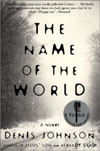
Denis Johnson missteps through a transition
by John Sewell
Denis Johnson's literary forte has always been depicting life in the nether regions. The author most known for his portrayals of drug abusers (Jesus' Son), drifters (Angels) and sociopaths (Already Dead) is finally moving from the shadows into a dim sort of light with his latest novella, The Name Of the World ($12/Harper Collins). Well, sort of.
Name focuses on the post-midlife quandaries of Michael Reed, a professor at a Midwestern university. Reed finds himself in an emotional coma after the death of his wife and young daughter in a car accident. Two years on, the protagonist is still meandering through life as more of an observer than a participant. In fact, Reed's detachment is so pronounced that the first person narration has a third person feel to it. Reed is in fact content living within his self-imposed separation.

He stumbles through life on his own, imagining relationships with strangers while doing little to encourage any real human connections. "[I] Went along through my tunnel, as I had for four years now. I took each step entirely out of a dull curiosity not as to what waited ahead, because I didn't care, but as to whether or not I could take one more step. I hadn't found much else to interest me along the way."
Almost by accident, Reed finds himself thrown into a variety of relationships that stir his shunted emotions. Foremost among these is a budding infatuation with the aptly named Flower Cannon, an art student at the university.
Cannon, a sexually provocative performance artist and weekend stripper, becomes an obsession for Reed, who creates artificial situations where the two will come into contact. Reed feels obvious sexual feelings for Cannon, but the attraction is truly based on several factors. He is smitten primarily because, through her reckless behavior, she experiences a gamut of emotions and sensations that Reed has denied himself. Reed's comparison of Cannon to his late daughter adds yet another twist to this already skewed tale.
Though Reed is obviously on the brink of some kind of breakdown or catharsis, he seems to function better than many of his associates. Reed's social circle is peopled by a brilliant professor fresh out of the asylum for depression with a proclivity for adultery, another professor in the throes of grief after a recent divorce and a pompous novelist who seeks validation through the adoration of sycophants. These characters actually seem closer to the breaking point than Reed, who, through his detachment, seems downright sane in comparison.
Johnson is adept at creating such off-kilter personalities, and therein lies Name's strength. But as the book proceeds the plot rambles, the situations become more implausible, the focus is lost and the believability of the story flies out the window. Apparently Johnson is aiming for some kind of surrealism akin to the works of Franz Kafka, Gabriel Garcia Marquez or the literary equivalent of a David Lynch film. Surrealism is a risky territory that Johnson is perhaps not fully prepared to tread.
One could argue, however, that plausibility is not the author's desired goal. Literature is indeed art—and in the realm of fiction, authors can create any kind of situations they damn well please.
But within the structural parameters of The Name Of the World, Johnson seems intent on destroying what is obviously a great foundation for a book. The author starts with an good premise for a story, creates an interesting cast of characters and then proceeds to destroy it all—biting off more than he can chew in an attempt to stretch the boundaries of expression. The book reads as if it was written for a deadline, as if Johnson started on a steady/studied pace, only to throw the denouement together in short order, almost as an afterthought.
This is not to say that you shouldn't read the book. The early passages are truly a joy. Michael Reed's nonexistent personality is compelling, related in a simplistic, matter of fact style similar to Camus' The Stranger. Such excellent groundwork only makes the dissolution of the plot more vexing, however.
Let's hope that The Name Of The World is only a slight misstep for Denis Johnson. The book's merits are as shining as it's errors are egregious. Retrospect will surely show the book as a transitional work. As a wordsmith, Johnson is capable of much better. And I'm sure that he's only making a detour en route to greater achievements.

February 7, 2002 * Vol. 12, No. 6
© 2002 Metro Pulse
| 




